Dorit Sasson's Thoughts on Building Your Platform, Finding Your Voice and Writing for Yourself10/28/2018 Dorit Sasson is an award-winning memoirist, writing coach, SEO specialist, and editor. I first met her on Instagram and was blown away by her platform--and I told Todd immediately that we had to talk to her. Thank you Dorit for interviewing with us!!!
You're releasing your next book Sand and Steel: The Spiritual Journey Home this fall. How has it been going? Actually, it's due for early summer of 2019, but in any case, the writing process has been eye-opening in terms of the themes of finding and writing about home. Discovering the home inside of you seems to be the over-arching theme and deeper insights about what it means to reinvent oneself after so many years in Israel. I wake up early each morning to reconnect with the Israel inside and discover how to bring that part out in the actual writing. Who designed your covers? The winning design came from 99 design. I am really happy with the way it came out. The designer really "got" Sand and Steel. While reviewing your work, reviews, and articles--I'm getting recurring messages of courage and voice. How did you find yours, and do they connect for you? As a writer, I've been known to carry a lot of shame, self-doubt and fear thinking people wouldn't take me seriously when all I needed to do was to learn how to advocate for myself. I could never write for example about serving in the Israel Defense Forces, my first award-winning memoir, in Israel because no-one frankly would care. Everyone, men and women included, does the army over there, so it's no big deal. In America, I and my story about my IDF service is a novelty. So at the time of writing, I had a choice: I could either let the voices of shame poke fun at me or I could hustle about my business. Every day is an exercise in learning to dig deeper, listening to the voice of intuition and getting past the struggle. It takes a lot of courage to stay present and listen to the nudges - the story whispers that are calling us. Many writers I've met worry about writing honestly about the roles their families, friends, loves, and the like have played in their story. Have you had this? Any advice you could offer to fellow writers? To get your reader to care about your story, you need to write it for yourself first. We need to protect ourselves as writers and particularly as memoirists which is why I coach writers focus on telling the truth. In most cases, they discover that their truth does not cross paths with someone else and that the story is benign. We build up the drama and tension in our heads to justify that our stories aren't worth reading. Many writers I've coached have suffered from the silent syndrome it's only when they are able to get past the voices of fear and doubt, are they able to experience a real breakthrough. In your opinion, is it better to be objective, subjective, or somewhere in between in memoir? I am a big fan of truth telling. Our truth will always be myopic or in your words, "subjective" - for storytelling in memoir is based on our unique and personal experiences. With that said however, in order to embrace the full integrity of truth, one needs to strategically focus on turning points that are the building blocks for scenes. From this point, we objectively look at a scene as if we're watching a movie - the short and long zoom in camera lens and the unfiltered memories is the closest to being objective. When we unpack our takeaways, that's when we speak to our subjective truths which should also touch the reader's heart. Someone once advised me that when writing about yourself, your life, and memories, you have to let the story "stew" for a while before you can write about it. Is this sound advice? Yes, I like the action of "stewing" like writing in crock pot mode. But sometimes, this can be used as an excuse not to get the writing done. We live in an increasingly fast pace digital world saturated with celebrity writers and it's easy for writers to think they don't have something worthy to say and they freeze in their tracks. At the same time, perfection paralysis can stump a writer from never starting a book, a story, an essay. My recommendation would be to pre-write and journal about it. One such coaching exercise I have writers do is journal turning points or even whispers of nudges. This takes them out of their heads and unto the page. I think it's important to cultivate a writing practice and you've got to start somewhere. Kind of going off of the last question here--how much distance do you put between yourself and your subject when writing? Distance helps us with telling our truth. If we're too invested in justifying the memory, then we can't be creative. Only recently was I able to write about my mother's death which happened in 2013 for my current memoir Sand and Steel. Distance means time and space and learning to put emotions aside. The truth of then is not the same of writing about it as a character in "now" time and without distance, we can't get to know ourselves as characters (particularly for memoir) and characters run the show. Sand and Steel, the memoir I'm writing now is about leaving Israel to come to Pittsburgh and because I no longer live in Israel, it's much easier to view my journey through the lens of longing. How would you describe your book coaching style? I intuit a person's story before s/he even knows it. I listen deep for the threads of human emotion. People come to me often nervous, scared and overwhelmed. They feel awkward telling their story or they are so focused on the story but get distracted by what they think is the core truth. I hold the space for them without judgement. I listen deeply and compassionately. I give each writer the marketing and developmental/coaching ears and eyes s/he needs. We get clear on goals. We get clear on their timelines, scenes, structure and then worry about publishing. Some have never taken a memoir writing class before so my job is to teach them craft essentials and best practices. I see my job as unleashing the published writer within whether they are re writing pure non-fiction or prescriptive or literary memoir. Do you have any snippets of wisdom, quotes, that motivate you as a writer? The quotes I use to motivate me are the ones that lend themselves to the actual scenes in my writing. Since my memoir is a hybrid of story and prescriptive content, I rely on quotes to build on takeaways and connect themes. I have found some amazing quotes on forgiveness, self-belonging and connection, surrendering - in essence, life coaching tips and advice that are also relevant to myself as a writer. With that said, there are quotes that I live by daily. Like the famous Steve Jobs quote: "Remembering that you are going to die is the best way I know to avoid the trap of thinking you have something to lose. You are already naked. There is no reason not to follow your heart." To me, that spells urgency right there. What's one thing you wish you knew when you first started building your platform? 1. Not to get overwhelmed too quickly. Platform building is a marathon, not a sprint. 2. To recognize that a platform building effort can be as small as an email and not necessarily writing oriented. Think of it as personal outreach. 3. To realize that people really do *connect* to the work you put out there as a writer and not give up so quickly if you don't see traction 4. To not always be obsessed with aiming high. Local is even better. You don't have to run down perfect strangers to get noticed. Is there anything else you'd like readers to know? Cultivating a writing practice takes time. There's no one way to go about it. But giving up puts you at ground zero. I like to think of writing with a sense of urgency. If I were to die tomorrow, would I have said everything I could say until that point? Follow Dorit Sasson on Facebook, Instagram, and Twitter. Find her memoir here. Check out what she's up to here!
0 Comments
But first, some background from Amber Renee herself--Amber is a poet and performance artist "//who writes to // delight the imagination; skirt // slithers straight flung across // your tongue & bite you." Mega thank you to Amber for interviewing with us!!! What have you been working on lately? What's got your interest right now? Oh boy, let’s see. Currently I have a collection of dissociated essays & shorter fiction half thoughts 99% completed; it’s short. A bare bones of story & poetics, archetypes personified for feeling’s sake & a joy of writing mixed with desperation. I might go over the 7 pieces each again though. I’m a perfectionist when it comes to this stuff. //So as well, I’m 7 orchestrations deep in the musical accompaniment of my poetry book “Thoughts On This Most Recent Episode.” It’s set to be done in 8 parts, so I’m alllmost complete with that one too!! (https://amberreneepoetry.bandcamp.com/album/thoughts-on-this-most-recent-episode) I’ll be particularly proud finishing the over 40 minute piece, because I Am Not A Musician. But I did it, & maybe I enjoyed it too:) //Next I’ve been practicing & brainstorming on how to perfect my performances of my book with music. I’ve been lucky enough to have been given many opportunities to be on stage at the many readings Philly offers. (https://www.youtube.com/watch?v=UZWT4pMetKU&t=1s) Seeing what emotions I can bring out in people by the use of my words & body language has been a trial & error. //Okay, onto the next project….. & can you tell I’m bipolar yet? Many unfinished projects done in whirlwinds of creativity. I’ve been on & off creating a very important to me collection of 3 fiction stories. The collection highlights the application of mental illness, grandeur & psychosis, while forcing the reader, through their reading, to understand the where & why & how it’s all coming from. The stories are surreal, automatic & poetic. It will be called “The Occasional Delusions Of...” //A fun & easy thing I've been doing is online, I have been enjoying the process of pasting my poetry onto strange visual art I make. (https://www.instagram.com/amberreneepoet/) //Lastly, I’m idly collecting poetry over the past 2 years to put out another collection. Do you go into composing your work with a theme in mind, or does it emerge for you? Hm, I guess I usually somewhat know what mood I’m going for, but only after it emerges for me;) //Because only in fiction writing do I outline exactly what I need to cover, what needs to happen, etc., in order for me to capture the theme or message or plot point I’m going for. In poetry & music however, I go into it with only a vague feeling that has emerged for me pre-writing. Pre-writing happens throughout the day, all times that are after being done writing during one session, & before writing for session 2. On your Facebook your poetry is often accompanied by some really cool companion art. How do you go about translating your work into an image? Structurally I use multiple apps, sometimes at different times, usually overtop each other. I’ll list a few: Photo Editor Pro, Glitch!, Overlay, 8Bit Photo Lab, Fraksl, Layout, Texgram Legacy, & of course: Insta. Otherwise I think I translate my work to art by sheer will. My spatial relationships in art & design are poor, I’m sad to say. I’m no visual artist. I play. I play & I try. Thank goodness for the reverse button & to saving every layer as I go. I've seen/heard some of your performances, namely Pt. 3 from "Thoughts" and "Universal Void Theory." I really feel like you command a presence and own the space you're in. How did you find your voice and style? Any advice to fellow poets still trying to pin theirs down? Well, you’re giving me some new information. Glad to know my words & body are enough to command & own. I suppose the best & most cliche way of saying I found my style would be to say I followed my heart. I feel compelled to bow before my wishes for myself; that is, to be the weirdo-est thinking poet you know. My advice then is to take time, serious time, to peer around inside your own heart & write what you see. What style does your inner voice speak in when you stay silent? Copy it. Think about it. Assimilate it to your outer voice & see what happens. (https://amberreneepoetry.bandcamp.com/track/universal-void-theory) Universal Void Theory How do you prepare for a reading? Any tips you can share? Ha. I prepare by wondering how in the world I thought I’d have the spoons* to get up on a stage & perform that night.. //No, but once I drink enough coffee.. (never enough coffee) & I’m on my way driving toward the city from my suburban home, I’m listening to music only specifically chosen: Kanye, Pusha T, Lorde, Acid Rap, DAMN., Run the Jewels etc. It’s obvious the type of mood I’m getting into with that selection. I prepare by amplifying my self worth by listening to grandiose music. Before that it’s a million & a half read throughs of my set that night. Any tips would comprise of those two rituals. Practice, practice, practice, then rock out to your favorite, most self-empowering music right before the actual reading. I've heard you perform live and in studio for recording. Are there any notable differences for you in how you read? Which do you prefer? Oh for sure. I’m a very nervous recording artist. I say one word, hate it, try again, hate it, try again, hate it, but go with it because I can’t just say this one word over & over again,, or this 20 minute piece will never get recorded. //I much prefer reading live, without headphones & a recording mic in my face. Live I can flow, & move, & mess up without the need to go back & perfect it. Live is definitely more freeing. Is there anything the audience can do you prepare for a performance? Yeah, of course checking me out online is the best thing to do. I tend to write with a lot of flair in my wording, which can make it difficult to understand right off the bat. Especially live, where you don’t have the words to back up the reading, or performance. & when I use my speaker, I can only imagine your attention splits to hear the music too... Bottom line: Check me out online. Who's one poet you love who you feel more people should know about? Good question. I’m going to go local poet & say James Feichthaler. He’s a hustler when it comes to this poet stuff. A real cool dude, a forrealist inside & out & you’ll have to read his stuff to understand. Is there anything else you'd like readers or fellow writers to know? I just would like people to know how from the heart my writing is, & to give it a try. I’m just a neurodivergent mixed girl trying her best to stay above water. Any support for my writing, any, is so appreciated. Whether in likes & comments (preferably SHARES!!), or stopping by a show, or maybe even buying a book; I’m appreciative & hope my writing opens you up to taking that inner journey with me. If only to blueprint for you, how you could better know yourself by exploring your own psyche. Thanks:) Let's start off with a little bio about Maya Tyler, by Maya Tyler! Maya Tyler, wife and mother of two boys, writes paranormal romance with a twist. Her debut novella Dream Hunter was released in December 2014. Her second novel A Vampire’s Tale was released in March 2017. She enjoys reading, listening to music (alternative rock, especially from the 1990s), practicing yoga, and watching movies and TV. In her “free” time, she writes books and blogs at Maya’s Musings. What are you working on right now? I have a number of projects in the works. Right now, I’m focusing on finishing a sequel to my last book A Vampire’s Tale. This story is about the group of wizards I introduced in AVT. Who are you reading at the moment? I read a lot of books—as many as I can—in romance, of course. I enjoy the historical and paranormal subgenres. Right now, I’m reading book three of Sarah Maclean’s ‘The Rules of Scoundrels’ series. What book/series is your current obsession? Definitely Outlander. I’ve read the first four books, but I’m waiting for the TV show to catch up before I start the next one. I instantly fell in love with Claire and Jamie. How did you come to find your voice as a writer? Has it changed? I found, even as a child, that I expressed myself better in writing so writing became my emotional outlet, like Stephen King’s “I write to find out what I think.” My writing has changed as I’ve matured. At one time, I would write the simple ‘hero + heroine = happily ever after (HEA)’ story. I still write the HEA, but I’ve added more depth to my work…my characters have complex personalities and messier lives. I think I can attribute my personal experiences with the growth I’ve seen in my writing. You write career-minded heroines who are "hero[es] of [their] own story." In your opinion, what's one of the most important qualities a strong female lead should possess? I view strong female leads as exhibiting confidence in their choices. My heroine in A Vampire’s Tale Marisa Clements decided to leave a “safe” job to pursue her dream of being a writer. What makes her a strong character is her sheer determination to succeed. She picked the hard road, but she has no regrets.
"Just for Tonight," was published in an anthology with Breathless Press, Dream Hunter with Just Ink Press, and A Vampire's Tale with Tirgearr Publishing. What made you choose them? What do you look for in a publisher? I wrote my short story “Just for Tonight” for a Valentine-themed series for our online writing group blog The Nuthouse Scribblers. Several of the ladies in our group published with Breathless Press—I can’t remember how it came about exactly as I had little involvement in the process beyond contributing my story—the anthology idea was pitched, and With Love from Val and Tyne was born. I submitted Dream Hunter to three publishers who were recommended by my online writing group. For A Vampire’s Tale, I used the Twitter pitch party #PITMAD. Three publishers— Tirgearr Publishing was one of them—showed interest, asking for sample chapters and synopsis. As a new author, writing a book is only half (and maybe not even half) the battle. Finding a publisher—the right publisher—is a little like looking for a needle in the haystack. You know the needle’s in there. Somewhere. But it takes time and energy and patience and perseverance to find it. I first looked to the recommendations of my peers. I researched publishers who were open to unsolicited submissions and printed my genre. Authors Publish Magazine and Absolute Write are great resources to find and vet publishers. Then I waited… I get it. There are a lot of writers out there. And we all want to be published. Some publishers take three to six months (or longer) to review manuscript submissions. Some don’t accept simultaneous submissions. Some don’t send the “Dear John” letter. In this day and age, the golden age of the Internet and instantaneous everything, I thought there must be a more time-efficient method to find a publisher. And I found it. Social media. Twitter, in particular. I look for a publisher who offers a professional contract and fair royalty rates. One who provides cover art, editing services, and post-publication support. I have been most fortunate to find this at Just Ink Press and Tirgearr Publishing. You've written two fiction books, published in an anthology and you currently maintain a newsletter and have been running your blog, Maya's Musings, since 2014. What keeps you writing? The same sheer determination that I give my characters. I always wanted to be a writer. A writer writes. It’s a slow process. The anthology was published in 2012. My debut Dream Hunter was published in 2014. A Vampire’s Tale was published in 2017. During that time, I’ve had work full-time, both at home and in the “real” world, family commitments, and serious health issues. I work hard and dream big. To date, my books have only been available in e-book format, but I hope to see a book of mine in a physical bookstore someday. I write a (pretty much) weekly blog Maya’s Musings. It’s a great tool to connect with readers and other authors…as well as fine-tune the ol’ writing skills. My newsletter is quarterly, and I’ve had a lot of fun creating new issues using the Pages app on my MacBook. Being an author, especially one who actively promotes published work, involves much more than just writing. I’ve put my business skills and experience to good use in creating an ever-evolving marketing and promotion plan. I’ve picked up web and graphic design, and I manage my social media profiles. It’s all about exposure and engagement. You do this really awesome thing where you promote other authors through interviews and features on your blog--what's the most memorable moment/experience you've had when meeting fellow writers/readers? What really stuck with you? I really enjoy the special author posts, like interviews and book spotlights. It’s great to help other authors out and I’ve met a lot of great people—readers and authors—through the process. Some of my proudest moments include booking authors I’d read for years to visit my blog. Tara Taylor Quinn has visited my blog three times. I’ve also interviewed Roxanne St. Claire and featured Karen Rose Smith twice. Yes, I felt a little star struck each time. And I’ve found new authors to read as well.
It's been years and I'm still trying to finish my first book and I know a lot of people in the same boat! What advice would you offer fellow writers trying to cross the finish line? I’ve been there. I have so many unfinished projects floating around. That said…I have a lot of suggestions because everyone operates differently. The main trick is to get writing. Just like exercise, the hardest thing is to get started. 1. Write a short story about a character (or two) from your book. 2. Write anything. Use a visual prompt. Enter a writing contest. Write about the weather. Write about not writing. 3. Start a new project (maybe you’re just tired of your current book) and return to it again at a later date with a fresh perspective. 4. Read. Read motivational stuff. Read for pleasure. Remember why you love the written word. 5. Don’t give up. You have a story (or ten) inside of you that only you can tell. How do you feel books like the Twilight saga and shows like The Vampire Diaries have impacted the paranormal romance genre? Any book or show that has romanticized the paranormal—vampires, shifters, etc—has definitely boosted the popularity of this subgenre. A paranormal romance story represents a modern fairy tale. The heroine/hero is unhappy. She/he meets a supernatural being who doesn’t quite fit in. They (mostly) live happily-ever-after. The Twilight books, like typical coming-of-age stories, resonated with teens navigating the unchartered territories of relationships and sex. As teens became an emerging demographic—experimenting with new authors and reading young adult, erotic, and paranormal romance—the demand for paranormal romance increased. This led to more publishers actively seeking stories in this subgenre. Is there anything else you'd like readers to know? To find out more about me and my work, you can follow my weekly blog Maya’s Musings (http://mayatylerauthor.blogspot.com) and subscribe to my quarterly newsletter (https://www.mayatylerauthor.com). You can also email me anytime at [email protected]. I love hearing from fellow readers and authors! Where to follow Maya: Website Blog Goodreads Google+ YouTube Where to find A Vampire’s Tale: Amazon Smashwords Apple Kobo Barnes & Noble Photo credit: Maya Tyler Big thanks to Scott Gilmore for interviewing with us! Scott is an author of young adult fiction and teacher from Northern Ireland. Check out his recent release Inside Iris and see why readers are calling it a "fantastic read!" 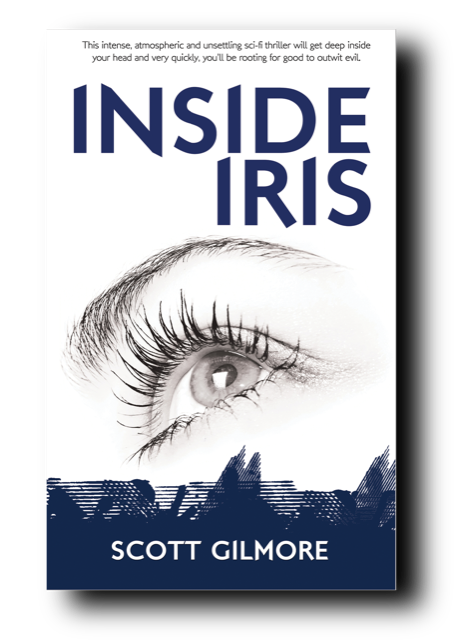 How have things been going since the release of Inside Iris in September? Since the book was released, I have had many positive reviews and responses from adults and children alike. Being a teacher, I have what you could call a captive audience and the children I have had read the book for me have given me amazing feedback. Considering Iris and the narrator, Jade, are both female, I was reassured to find that the boys a had read the book were equally as gripped and intrigued by the story as the girls were. Most of my time has been spent working, as I am still a full-time teacher, but also making content for a digital media campaign. This has included taking photographs, compiling iMovie teaser trailers and, best of all, recording audio with an ex-pupil of mine who is now a teenager herself. Hearing this very talented and capable young lady take Iris’ voice and personality and portray it in the audio and video content I created, really excited me and was able to bring an extra dimension to Iris as a character. I hear you're in the works of the sequel to Inside Iris. Care to share any details? I have long been intrigued by the dystopian genre in general, from one of my favourite TV shows, ‘The Walking Dead’, to one of my favourite books, ‘The Road’ by Cormac McCarthy. There is something in this genre that allows me to explore elements of reality with the right mix of Science Fiction and Fantasy. The Iris Trilogy will explore how Iris transitions from being a ‘lab rat’, whose captivity ensures freedom and survival for many around the globe, into being a mature, independent young lady with her own personality and drive. Through the three books the reader will join Iris in her desire to piece together an identity out of the fragments left over when Jade and The Resistance freed her from The Institute. As a writer working in plays, films, music, and drama—has it helped you as a fiction writer? How so? Vice versa? I have experienced many forms of art and creativity in my thirty-four years. Music has always been a huge part of my life and I performed, wrote and recorded my own music since I was a teenager. When Writing Inside Iris, I used music to help create a mood and an atmosphere as I wrote certain scenes to ensure I had a continuity when getting into Iris’ mind and emotions. Being a very visual person, movies and drama help me to see the world rather than just describe it through words. I would try to visualize the scenes playing out before me as though they were being acted out on a stage or a screen in my mind. Through this process, I find that I am able to pick up on subtleties, like looks and gestures, and I can add those through the description I add in the prose itself. When I was in my early twenties, I completed a Masters Degree in Creative Writing at Queen’s University in Belfast. Through this course, we were encouraged to explore many creative outlets and styles of writing, like prose, poetry and drama. I found that this outlook on the creative process was very enlightening and I believe that, no matter what medium you express yourself creatively, as artists we can all learn something from one another. There is no guarantee one person’s method will transfer seamlessly into your craft, but being open to change and evolution as an artist is paramount if you are to develop and grow. At what point did you know Inside Iris would have a sequel? I knew that the story arch I had for Iris was too wide to be explored fully in one book. The characters, interactions and relationships between them are too complex for one book. Secondly, the world that I have created, with the disease and viral outbreaks, questionable moral codes of medical research and hidden actions of a new government in The Authorities has too much in it to be explored fully even in the trilogy I had originally planned. The Iris trilogy will explore her journey fully. Iris’ story will be told in the three books I have planned and am writing over the coming months. On the other hand, I have prequels and other novels for young adults as well as adults that will illuminate the other sides of The Authorities, Hexingham and the world we explore in the Inside Iris trilogy. One of your novel's reviewers commented, “Description of people and surroundings so detailed from page one to the end. You could virtually be there. Gripping story and well worth the read.” What kind of research did you do for Inside Iris and what helps you balance showing us your world with keeping us in suspense? When researching Inside Iris, I generally stuck to researching viruses and diseases. I know I don’t work for the World Health Organisation so, when researching diseases and viruses, I wanted to have a real life virus but evolve it in such a way that current treatments were ineffective. The idea for this came from the current worries doctors around the world have that antibiotics are becoming less effective and, as a society, we need to be limiting the usage of them unless the patient is in serious need of them to recover from their illness. The suspense issue was one I mainly used characters to tease out bit by bit. The main tension is that of Iris’ detox from the drugs that The Institute have her on in order to carry out the more intrusive testing that caused Dr Rosen to leave. Throughout this detox, we get glimpses of Iris’ past that tease the reader by giving intendedly vague snapshots of what went on behind the walls of The Institute. These glimpses and snapshots are revealed later in the series, along with more shocking and morally dubious actions by the medical research team at The Institute. I believe that suspense and jeopardy are key in keeping an audience or reader on the end of their seat. The author should reveal just the right amount of detail to keep the reader wanting more and to read on. This technique of ‘tease and reveal’ is something I try to ensure I sculpt into my writing and polish up during the drafting process. Some questions are answered in Inside Iris, but many more are raised to engage the reader’s attention ahead of the second installment in the trilogy. Do you start writing with your characters fully formed, or do they emerge as you go? I believe that characters are as important as the story itself. When I have an idea or a concept for a piece of writing, it is a basic platform to explore the world and characters that inhabit it. Most of the time, when I plan the character, I let them lead me in a series of monologues where I explore their back story, family, hopes and dreams as well as successes and traumatic events that may have shaped them as people. We are all shaped by the events that punctuate our childhood, though adolescence and adulthood. These events can mould and shape us for the better, but they can also twist and distort us to the detriment of our growth and development as people. Yes, I plan the characters, but they also lead me, filling in the blanks and showing me how they want their story to be told. Who designed your cover? The cover was designed by the publisher through the Kindle Direct Publishing process. I paid a fee to have the work critiqued and edited. Once this was done, the publisher had an artist design the cover based on some ideas I had shared with them. In the Left Hand of Darkness, Ursula K LeGuin says, “Sci-fi is not predictive; it is descriptive.” Do you agree? I believe that Science Fiction is fiction that takes in the full scope of modern-day life as well as the lives of our children who will undoubtedly live in a world even more reliant on Science and Technology than we are today. Ursula LeGuin also writes that ‘truth is a matter of the imagination’. I take this as meaning that we, as authors and artists as a whole, need to take the world (the truth) as we see it around us and interpret it in our own way (the imagination). This interpretation and desire to make sense of the chaos and nonsensical events or actions around us. This is what makes art and artists so important in our eyes today but, more importantly, the eyes of those who look back on our time and deduce their own meaning and interpretation with hindsight on their side. As Science Fiction authors, we need to use our creative licence to explore the Science and Technology that is rapidly infiltrating every thread of our life and society. We need to question its use, its apparent necessity and also what could happen if Science, Technology and the morals surrounding them are abused or manipulated by the hands of those charged with protecting us. What nuggets of advice would you pass on to other writers working in YA fiction?
My main advice is to have strong, young characters who will captivate the imagination of the reader who has invested their time and money in the book or eBook they hold in their hands. The good and bad thing about young people is that they are honest, and brutally so. This can be a blessing at times, but their words can also be a dagger in your heart if they so wish them to be. This young readership is honest, intelligent and switched on to what they like and dislike. Being condescending and talking down to young people is one of the biggest mistakes we can make as YA and Teen authors. The best writers, playwrights and poets always say to imagine that your audience are more intelligent than you are. That way, you give them the respect and trust that they are an equal in the transaction that is about to take place between writer and reader. Is there anything else you'd like readers to know? I would like the readers to follow me on the following channels to ensure they are up to date with the latest content, giveaways, promotions and SG Fiction news: on Twitter @SGFiction; on Instagram SGFiction; on FaceBook SG Fiction; on YouTube SG Fiction Website also here. Photo credit: Scott Gilmore 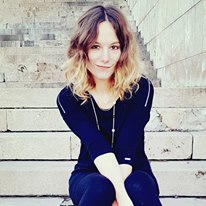 Honey Due. Writer of stories. Self-proclaimed daughter of the dark and painter of the dream maps in our heads. Author of Grimmest Things. Subject of this interview. What led you to using a pen name What would you recommend to others wanting to do the same? I started using the name Honey Due on a blog because I was really shy about writing under my own name. It's actually a funny story, I have a habit of jotting down ideas and stray thoughts, you know, in case they might be useful to me later and I'd actually noted on my phone the phrase 'milksweet and honeydue' with that “wrong” spelling a few weeks before starting the blog and then, when the time came to choose a name, it just connected in my head – HoneyDue, that's why I thought it in the first place. And that's how it's been. I think it really depends on the individual, I know a lot of people who write under their own name and sometimes feel foolish. Then again, I know a lot of them who enjoy it, so I guess it really depends on you. I believe you can be anyone, so why not be your pen name, whoever it is? Is there anything you do to get in the zone to write? How do you find your flow? I listen to music, always. I'm a big rock and roll fan and I'm always either with my headphones on or blaring some song on the speakers. I always listen to music when I write, it just helps me flow. Also, I try to keep away from my phone or checking stuff online too much, because writers are by nature greatprocrastinators so if there's something you wondered about in 2ndgrade, you'll remember it just as you're sitting down to write your big novel and it will become imperative. Also, I drink coffee or tea, or something, it doesn't really matter what, it just helps to sip something. As for the flow, it sometimes comes on its own, it sometimes hangs back, but I figure if I don't write, obviously it's not gonna come. So I write and if it wasn't there in the beginning, it usually shows up along the way. In a Q&A you mentioned you designed your book cover yourself. How did you put it together? What appeals to you in a cover? I think there are a lot of things that can appeal in a cover. I like pretty ones, magical looking ones, like the cover for 'The Night Circus' by Erin Morgenstern. Or the ones particularly dark and eerie, like 'The Tooth Fairy' by Graham Joyce. Both beautiful reads, also. But then, the book I'm reading now only has a tree branch on it. Really quite simple. Books usually call me out, I guess, 'cause I have books of very varying covers. As for my own cover of Grimmest Things, yes, I designed it myself. I'm very passionate about photography and the cover was a great chance to try something out, do something I hadn't done before, which I'm always looking to do. To be honest, the cover is really just a pond that's been meddled with. We meet quite a few characters in Grimmest Things. What helps you manage a large cast? Funny you should ask, I was just writing earlier about writing “the bad guys” and how the writer always gets into their heads, so that they're no longer the bad guys. I'd say some of them have common traits, some could even be a different faucet of the same character, although they're not. I just wrote the stories as they came to me, described the characters as they painted themselves in my head and the cast just got...big. So, to answer how I manage the many characters in GT, I'd say one at a time. Your book is praised for being raw and allowing us to experience pretty much every emotion possible--to you, what's the most important thing about capturing emotion? Emotion is what drives us, naturally. I'm a very emotional person myself and I really think people want to read something that speaks to them, that plays on their feelings. Books are often an escape into a different reality, but also a friend, and you really just want a friend who gets it, don't you? We're very affected by our emotions and most of us are very emphatic. Fear has an amazing hold over viewers, often even stronger than love, because as soon as you read the first sentence, you're seeing yourself on the page. I guess that's why I wrote so many dark stories, come to think of it, it's an emotion that fascinates me. As is grief, pain, all that bad stuff we're forced to deal with in life – that's the important thing about capturing emotion, it shows people they don't have to go it alone. Many reviewers are blown away by your ability to keep us in suspense and deliver a twist. What helps you keep us guessing?
I almost never see the full story when I sit down to write. I just get a glimpse of a sentence, a word, something that gets me going and then I just follow it there. Often, I'm going 'no way' as I write, because I'm just as surprised as the reader. Then there are times when I start writing a story and I get bored. No, this is too normal, I've heard this story a million times before. Because at that phase, it's just me going along with the story and I get to wondering why, if I'm not interested. This makes me think, makes me ask 'if this happens, then what if that also happens', 'what can I make real?' - and the answer's usually anything. What's one thing you think readers generally don't know about the fantasy genre? I'm trying to think of an answer, but I think fantasy readers know quite a lot about it. I'd say it's the rest of them, the ones who don't “do” fantasy who have a whole lot to learn. I think fantasy often gets a bad rep because it's “childish”, or at least it's considered so. You know, what with all the dragons and goblins and all that...but it's not. I haven't yet found a single genre as deep and as compelling as fantasy. Fantasy is in our nature, as humans, to create, to wander off. I wish more people knew it's okay to go off into a fantasy, to leave your boring little brain at home for a few days. What advice would you offer to your fellow writers? To write for themselves. I often hear 'yes, but how do you know people are going to like that?' and I always find myself telling the same truth – I don't really care. I'm not writing for them. If people read my stories and like them, I'm honored. I'm truly very happy when I hear someone tell me how much they liked it, because then I know they understand a bit of my soul and I theirs and it's a wonderful connection. But I only write for myself. I'm telling myself the story and I think any writer should do that, at least at the very beginning of writing it. And stick to that. If you, the initial reader, find that at some point you no longer like it, then listen to that voice. Where do you see yourself going next? I've always enjoyed experimenting with genre and particularly with age groups. I'm working on a children's fantasy book at the moment which will come out in December, if all goes well. I enjoy writing for children as much as I enjoy writing for adults, because frankly, I don't see that much of a difference. Kids are these incredibly intelligent and perceptive creatures. They have a right to good, clever fiction. After that, I don't honestly know what's next. But one thing I can tell you is I am writing. I will always write, so be prepared to hear from me again. Is there anything else you'd like readers to know? I already touched on this a bit earlier, but I'll say it again. If you've enjoyed what I've written, then I'm truly honored. It's a phenomenal feeling, for me, to see that other people spark at what I write, that they relate to it and enjoy it. It makes me very happy to hear from my readers, to hear someone liked a story of mine or was touched by a particular moment. Find Honey Due on Instagram , Facebook, and Twitter. Check out her blog here. Photo Credit: Honey Due
Your chapbook All Those Lilting Tongues, was just released earlier last month. How's it been going since then? It’s going great! I’ve been putting the feelers out to set up readings, interviews and classroom visits locally and in the surrounding counties. Part of me is still trying to actually believe that I have a published book. It’s all quite surreal. Your bio says your first love was poetry, how did you come to find it? What makes you stay? I fell in love with poetry, or verse, when I was young child reading Dr. Seuss. The sing-song cadence of Green Eggs and Ham literally made me giddy and I remember going around chanting “I will not eat them in a boat, I will not eat them with a goat…” etc. for hours on end. Later, as I became more exposed to poetry and began reading different poets from different places, time periods and movements, I grew to not only love its musicality, but also how it often bends or molds language to create sound, or image, or mood…how it makes a statement or evokes emotion…how it becomes a “unique verbal object” as W.H. Auden so eloquently described it. There is something empowering and euphoric about creating these objects, these pieces of word art…that’s why I stay. Your bio also says you enjoy writing in all forms—are there any lessons you've learned as a poet that help you when working in other genres? The most significant lesson I’ve learned is how in poetry every word is vital, each one occupies a precise place, serves a unique purpose and must propel the poem forward. No word in poetry is wasted. That is how I approach writing non-fiction or fiction. I respect words and language and try to do both justice in whatever I am writing. I choose strong verbs and nouns, try to limit my use of modifiers, especially adverbs (any one who knows me will laugh as they read that because they know I detest adverbs), and I always strive to propel my prose forward as well as my poetry. Oftentimes, I get it wrong, but there are those moments when I do manage to arrange the words right, and it is a wonderful feeling. How does a poem begin for you? With an idea, image, or rhythm? Oh! All of the above and more! Sometimes its something I see, like when the robins eat the cherries off our tree every spring, that image found its way into “It’s a Waste of Magic to Wish Someone Dead.” Sometimes, it’s a line of dialogue such as “what is ‘I’m sorry’ to me now?” I heard that in a movie or tv show, I can’t even remember what it was, but that utterance turned into “Winter People.” Sometimes, its just an opening riff of a song looping in my head at 2 AM, “Driving the Desert with Zep” happened because “Kashmir” and the line, “tongues of lilting grace” was showing me no mercy and played itself over and over while I was trying to sleep. I ended up writing that poem at 2 AM to make the loop stop. Sometimes, an event or news story will trigger something in me and I feel the need to write a poem about it. “Rebirth” happened that way as I was watching news footage of how pollutants had turned a river into orange sledge. I think the best answer to this question is that, for me, poems just begin, they happen on their own, and I always try to pin them down, channel them, when they come to me. How do you choose form in your poems? This may sound strange, but I don’t. They choose their own form. The words usually come to me in spurts, or in waves, and I jot them down as they present themselves. It’s like a dam bursting. And when I’m done spilling and they are all on the page, I begin shaping them into lines and stanzas and cadence. I move them around, I change some, I discard some, I add some, and during that process the form begins to take shape. But it’s the words themselves that dictate the form by way of their sounds and their syllables and their impact. If the poem’s voice wants to be fluent and flow as though it were a gentle river, or even a raging one, then the lines are longer to enhance that sense of mildness or fury. If the poem’s voice wants to be stark, or broken, or even wispy, the lines are shorter to allow pauses for breath, or a disjointed cadence. I often read the poem aloud as I’m writing it, to hear how the words present themselves individually and holistically. It’s an organic, symbiotic process, one where I allow the poem agency to create itself.
Your lines “My callings / go unanswered / and the sunset / has lost your name” (from “Without”) have stuck with me for days after I first read it. Are there any lines you've read that have always stayed with you? First, let me say that I am humbled and happy to hear that my words touched you and “stayed with you for days.” That is something I always strive to do with my writing, evoke a response that lingers with the reader. In answer to your question…There are so many lines from so many poems that have touched me and stayed with me over the years that it would be quite impossible to list them all. So, rather than even attempt to do that, I think I will share the one that starting me on my poetic journey: I shall be telling this with a sigh Somewhere ages and ages hence: Two roads diverged in a wood, and I-- I took the one less traveled by, And that has made all the difference. That, of course, is the last stanza of “The Road Not Taken” by Robert Frost. I first read that poem when I was 12, I’m 55 now, and those five lines still resonate with me today. Out of all the poems, stanzas, lines, and words I’ve read and treasured since then, “The Road Not Taken” is the one that immediately pops into my head when I’m asked, “What made you want to be a poet?” It’s as though those last five lines gave me permission, or at least validation, to take that road “less travelled by.” However, it took me a long time to arrive at that proverbial fork in the road. Most of my adult life was spent floundering around, trying to find where I fit in the world, trying to stay on the main highways with everyone else. But, I came to it at last, and when I saw it there big and bold in front of me, Mr. Frost’s words just rang like a thousand bells in my head. Being an editor on top of being a writer, are there any challenges you face in the editing process? Is it harder for you to edit your own work or someone else's? Editing is always hard. When I was the editor for Oregon East I found it unsettling to place my hands on someone else’s piece. I felt like I was violating the sanctity of another writer’s creation. Of course, editing is a necessary process, and I never changed anything without the author’s permission. However, I think it is more difficult to edit my own work, primarily because I have a hard time “killing my darlings.” I actually have a file folder on my computer labeled “darlings” where I save lines or phrases deleted from poems. Most of those will never see the light of day again, but at least they have a comfortable place to live out their days, or until I find a new home for them. What's the best experience you've gained through writing? In all honesty, what is happening right now, or rather what has been ongoing over the past year. All Those Lilting Tongues is my first book publication and it has been such a humbling and amazing experience to go through all those stages. From first writing the poems, to re-writing the poems, to re-writing the poems again, to arranging them with some semblance of cohesion, to creating a manuscript, to submitting that manuscript, and then waiting…waiting…waiting…and waiting…to hear whether or not it has been accepted, to hearing it was accepted and freaking out, to going through the presale process, the editing process, to finally seeing it print and holding it my hands. It has all been exhilarating and surreal. I keep pinching myself. And I’m still freaking out. Where do you see yourself going next? Right now, along with promoting my chapbook, I am actually in the middle of earning my second Master of Arts degree, this one is in Literature. Not only am I writer, but I am an avid reader, and one of my goals (other than being a published poet) is to be a university professor and teach both literature and writing courses. I already teach college level courses in composition, but I would also like to spread my wings and explore ways of sharing my love for reading with students. I’m still writing, of course, because when the poems come, I must, naturally, put them to paper. I’ve also been kicking around a few ideas for my next book. So, all in all, my future looks to be one of words, both already written and those yet to be.
|

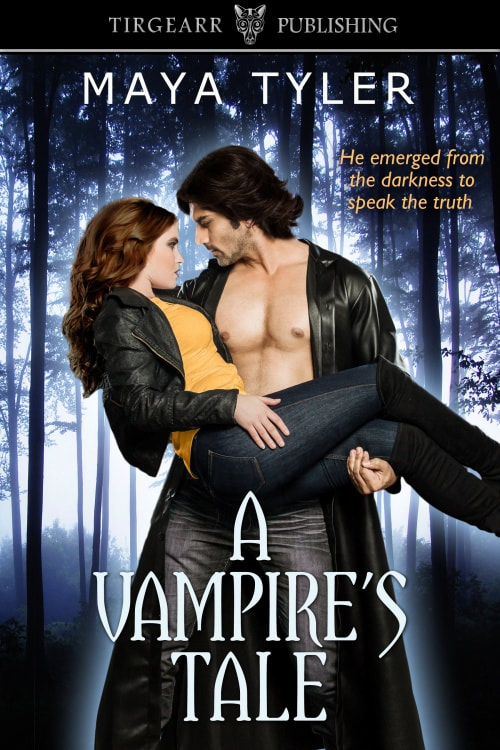

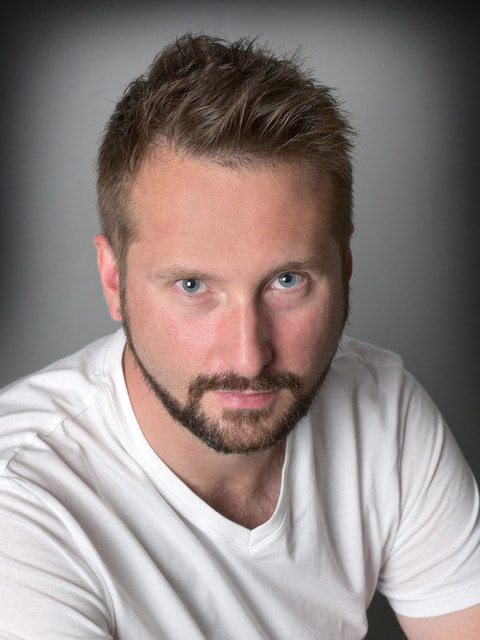

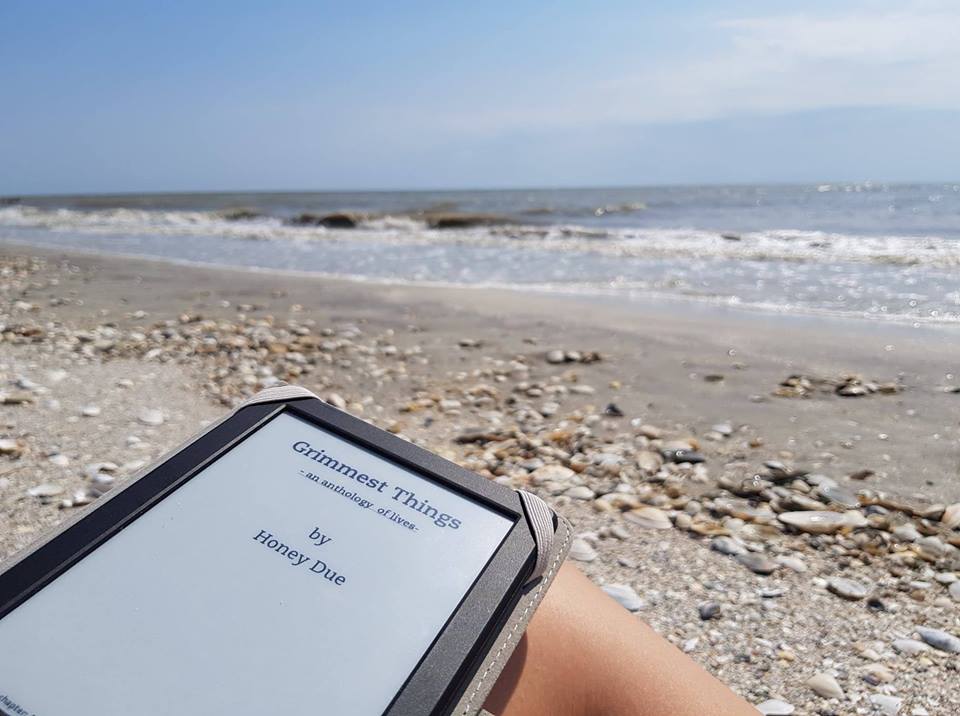
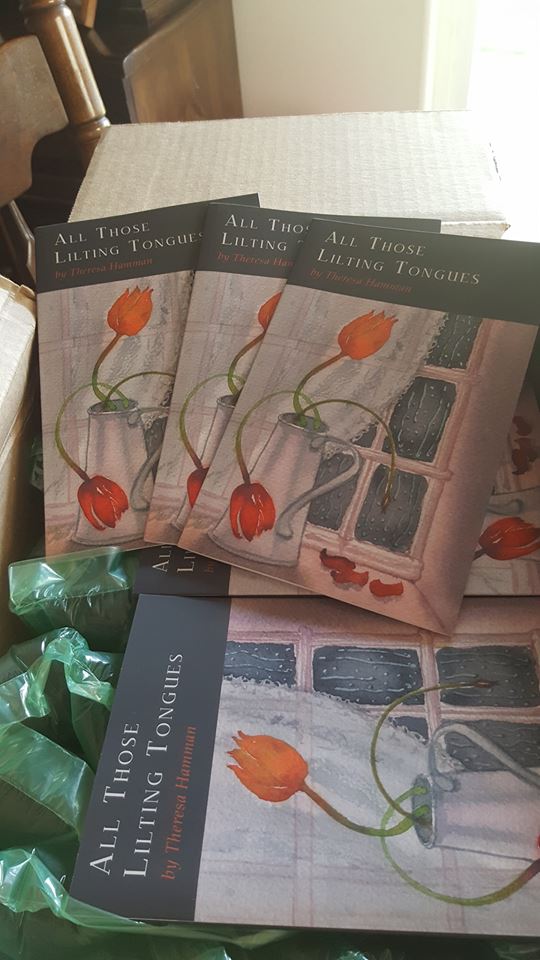
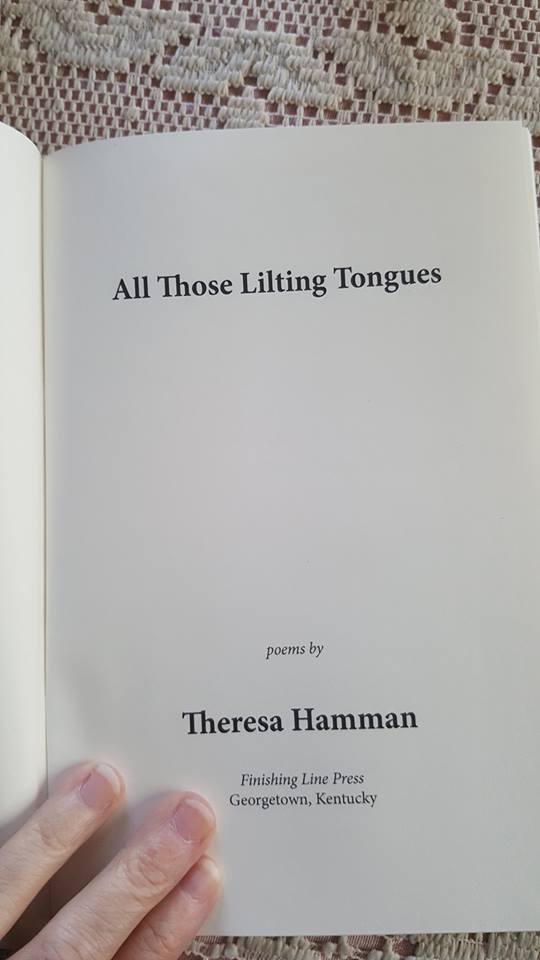
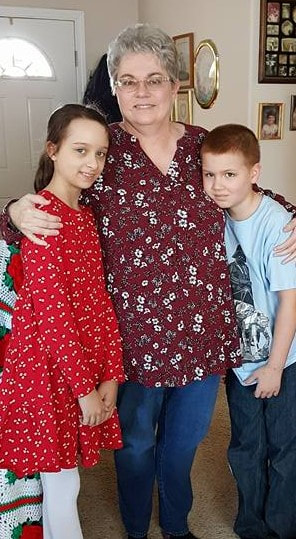
 RSS Feed
RSS Feed